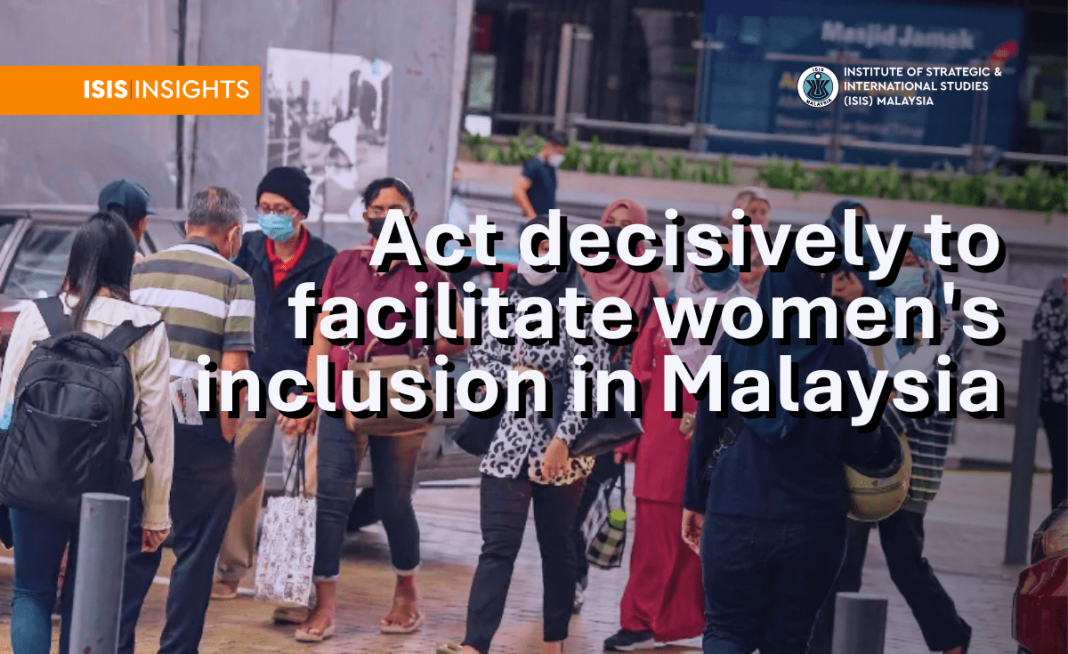THIS year’s International Women’s Day theme, “inspiring inclusion”, suggests that we imagine a future in which inclusion is not only a buzzword but a genuine reality for women of all walks of life. But what does it mean for Malaysia to be truly inclusive for women? From a policy perspective, this is a clarion call to design policies that remove the barriers preventing women from fully participating in society on their own terms.
Some progress has been forged on this front. Findings from successive World Values Surveys (WVS), conducted in 2012 and 2018, point to a growth of more inclusive attitudes towards more women participating in politics and the economy. In 2012, 70% of Malaysians agreed with the statement that men make better politicians than women but in 2018, this fell by 11 percentage points to 58%. This progress extends to business – there was a 14-percentage point decrease in proportion of Malaysians who think that men make better business executives than women.
Malaysia’s policies appear to have made parallel strides. Long-overdue amendments to the Employment Act 1995 came into effect last year – enacting crucial family-friendly workplace policies in line with international standards. Maternity leave was extended from 68 to 90 days and paternity leave from three to seven days. These policies serve to facilitate mothers’ return to work, potentially reducing the effect of the motherhood penalty on career progression and lead to better maternal and child health outcomes overall.
Looking at efforts to increase women’s representation in decision-making roles, Malaysia has set a 30% target of women board members in public-listed companies which has since come to fruition. Across the private and public sector, these target were already surpassed last year.
Lastly, policies addressing women’s wellbeing and safety have seen major achievements. The Anti- Sexual Harassment Act was passed in 2022 and in 2023, the Anti-Stalking Law came into effect. Altogether, there have been significant movements towards eroding the structural barriers preventing women’s inclusion in public life.
Of course, this paints an unrealistically rosy picture. While much of the groundwork has been laid to protect women’s rights, Malaysia is now confronting a far more challenging task: removing the longstanding structural barriers excluding women from politics and the economy that have seen only marginal improvements in the last decade.
While the 30% target for women’s representation across decision-making roles in business is achieved, women remain sidelined in political representation. In the last elections, women made up less than 14% of candidates. Only one in six ministers is a woman – even though there are more women than men in the electoral roll.
Notably, even though attitudes are gradually becoming more egalitarian, more than half the WVS respondents believed men were better politicians. Equal representation matters – it improves the functioning of Malaysia’s democracy and empowers women who would otherwise be sidelined if politics remains a male-dominated landscape. This is where Malaysia needs to act decisively – by first extending and mandating the 30% target for women in Parliament as a legally binding gender quota and ensuring parties nominate women candidates.
Economic barriers remain, too. Women’s labour force participation rates in Malaysia languish at one of the lowest in Southeast Asia, despite its level of development and women outnumbering and outperforming men in higher education.
The central issue underlining this is that women are disproportionately saddled with household and care responsibilities, which hold back their participation in the labour market. In fact, married women in Malaysia were 30% less likely to work and if they have children, this likelihood decreases by almost 3%. This situation calls for significant public investment in care infrastructure and services alongside policies like shared parental leave.
Issues like gender-based violence and poverty among women-headed households are further examples of persistent problems that Malaysia has yet to address systematically. As such, the task of facilitating women’s inclusion requires a more critical means of addressing the structural barriers that remain
Ultimately, this IWD reminds us that we need to redouble efforts to address gender equality. Action must be guided by a recognition that women’s meaningful participation in all spheres of public life, especially politics and the economy, is not only a boon for women, it also benefits society as a whole.
This article first published in the New Straits Times, 8 March 2024





